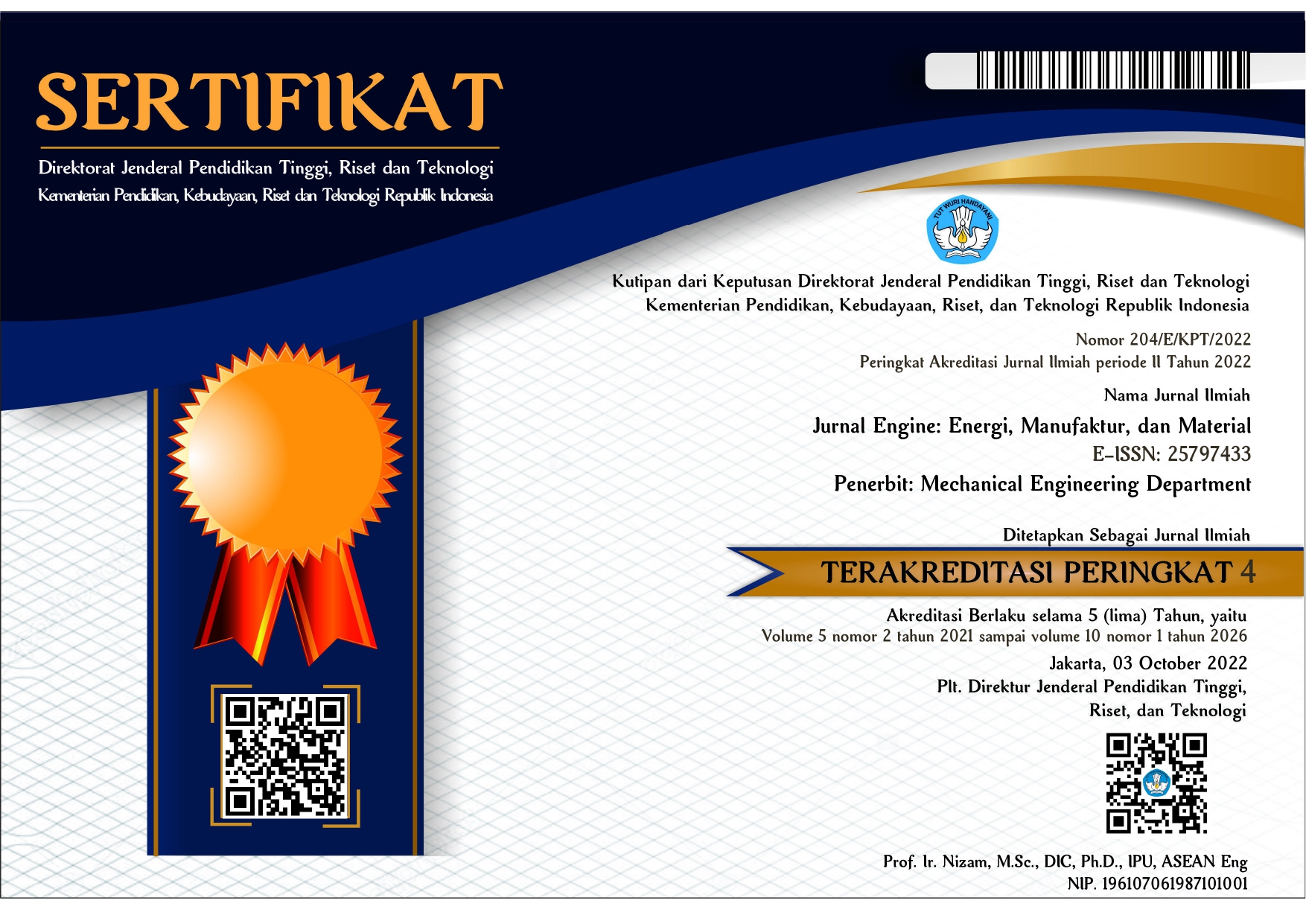Analisis Numerik Simulasi Kinerja Sistem Tata Udara Unitary Menggunakan Liquid-Suction Heat Exchanger dengan Refrigeran Hidrokarbon
DOI:
https://doi.org/10.30588/jeemm.v2i2.419Keywords:
liquid-suction heat exchanger, performance of AC unitary, hydrocarbon refrigerantAbstract
One of the environmental issues to be addressed, particularly in the field of refrigeration and air conditioning, is the destruction of the ozone layer and the effects of global warming due to the use of environmentally inefficient refrigerants. In the field of Refrigeration and Air Conditioning, refrigerant as a cooling medium, plays an important role, and until now there is still the use of refrigerant materials that are not environmentally friendly, generally synthetic refrigerant. One alternative refrigerant replacement against the synthetic refrigerant is hydrocarbon refrigerant (HC). On the other hand, several ways can improve the performance of refrigeration system by lowering the temperature of liquid line using liquid to suction heat exchanger. In this study, a numerical simulation was conducted to examine the effect of using liquid to suction heat exchanger on the performance of a unitary air-conditioning system using hydrocarbon refrigerant as a coolant fluid. The results are, liquid to suction heat exchanger increase refrigeration effect by raising heat exchanger effectivity, the highest increase is about 7%. But the use of LSHX also rises up the compression work by increasing heat exchanger effectivity by 19%. So the Coefficient of performance (COP) and relative capacity index decrease by 5%. Decreasing performance is higher in the unit that operates at higher temperatures.
References
Pérez-Lombard L, Ortiz J, Pout C. 2008; “A Review on Buildings Energy Consumption Information. Energy and Buildings”, 40(3): 394-398.
L. Maclaine-cross & E. Leonardi, 1996; “Comparative Performance of Hydrocarbon Refrigerants”, I.I.F. - I.I.R. - Commissions E2, E1, B1, B2, 11th to 14th February - Melbourne (Australia)
René Van Gerwen, Alan Gerrard, Fabio Roberti, 2008; “Ice Cream Cabinets Using A Hydrocarbon Refrigerant: From Technology Concept To Global Rollout”, 8th IIR Gustav Lorentzen Conference on Natural Working Fluids, Copenhagen
Australian Institute Of Refrigeration, Air Conditioning And Heating, “Natural Refrigerants Case Studies”;
http://www.ammonia21.com/files/papers/ airah-natural-refrigerants-case-studies.pdf
M. Mohanraj, S. Jayaraj and C. Muraleedharan; “Comparative assessment of environment-friendly alternatives to R134a in domestic refrigerators, Energy Efficiency” , Volume 1, Number 3, 189-198
Practical Application of Refrigerants R 600a and R 290 in Small Hermetic Systems, Danfoss Refrigeration & Air Conditioning Division
Mastrullo, R., Mauro, Tino, S. and Vanoli, G.P., 2007, “A chart for predicting the possible advantage of adopting a suction/liquid heat exchanger in refrigerating system”, Applied Thermal Engineering, Vol. 27 pp. 2443-2448.
Pottker, G. and Hrnjak, P., 2012, “Effect of condenser subcooling of the performance ov vapor compression systems: Experimental and numerical investigation”, International Refrigeration and Air Conditioning Conference, Purdue University, July 16-19, pp. 1-10, R031.
Pottker, G. and Hrnjak, P., 2015, “Experimental investigation of the effect condenser subcooling in R134a and R1234yf air-conditioning systems with and without internal heat exchanger”, International Journal of Refrigeration, Vol. 50 pp. 104-113.
Lemmon, E.W., Huber M.L., and McLinden, M.O., 2013; “Reference fluid thermodynamic and transport properties (REFPROP)”, NIST Standard Reference Database 23, v.9.1, National Institute of Standards 2013, Gaithersburg MD, USA.
Downloads
Published
How to Cite
Issue
Section
License
Authors who publish with Jurnal Engine: Energi, Manufaktur, dan Material agree to the following terms:
Authors retain copyright and grant the Jurnal Engine: Energi, Manufaktur, dan Material right of first publication with the work simultaneously licensed under a Creative Commons Attribution 4.0 International License that allows others to share (copy and redistribute the material in any medium or format) and adapt (remix, transform, and build upon the material) the work for any purpose, even commercially with an acknowledgment of the work's authorship and initial publication in Jurnal Engine: Energi, Manufaktur, dan Material. Authors are able to enter into separate, additional contractual arrangements for the non-exclusive distribution of the journal's published version of the work (e.g., post it to an institutional repository or publish it in a book), with an acknowledgment of its initial publication in Jurnal Engine: Energi, Manufaktur, dan Material. Authors are permitted and encouraged to post their work online (e.g., in institutional repositories or on their website) prior to and during the submission process, as it can lead to productive exchanges, as well as earlier and greater citation of published work (See The Effect of Open Access).


















